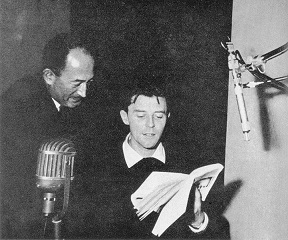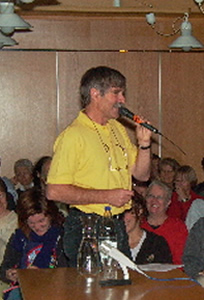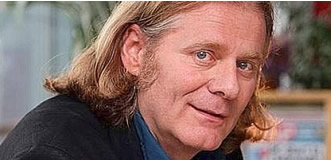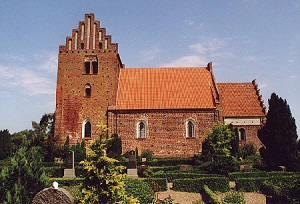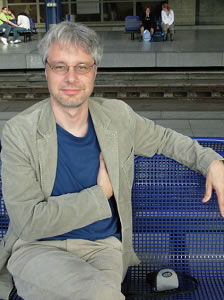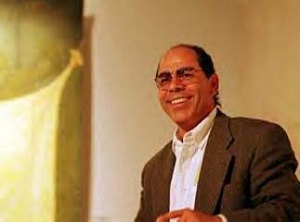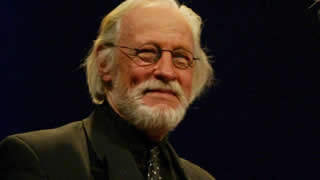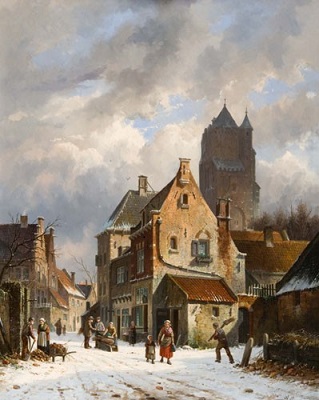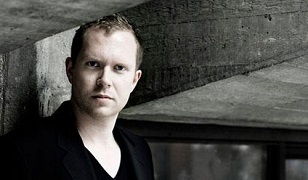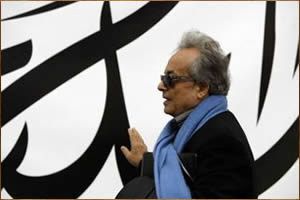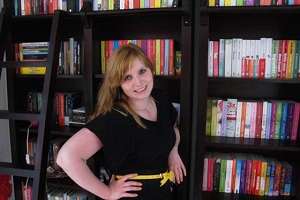De Amerikaanse schrijver Jerome David Salinger werd in New York geboren op 1 januari 1919. Zie ook alle tags voor J. D. Salinger op dit blog.
Uit:The Catcher in the Rye
“I’m not tired.”
When I got out in front of Ernie’s and paid the fare, old Horwitz brought up the fish again. He certainly had it on his mind. “Listen,” he said. “If you was a fish, Mother Nature’d take care of you, wouldn’t she? Right? You don’t think them fish just die when it gets to be winter, do ya?”
“No, but―”
“You’re goddam right they don’t,” Horwitz said, and drove off like a bat out of hell. He was about the touchiest guy I ever met. Everything you said made him sore.
Even though it was so late, old Ernie’s was jam-packed. Mostly with prep school jerks and college jerks. Almost every damn school in the world gets out earlier for Christmas vacation than the schools I go to. You could hardly check your coat, it was so crowded. It was pretty quiet, though, because Ernie was playing the piano. It was supposed to be something holy, for God’s sake, when he sat down at the piano. Nobody’s that good. About three couples, besides me, were waiting for tables, and they were all shoving and standing on tiptoes to get a look at old Ernie while he played. He had a big damn mirror in front of the piano, with this big spotlight on him, so that everybody could watch his face while he played. You couldn’t see his fingers while he played―just his big old face. Big deal. I’m not too sure what the name of the song was that he was playing when I came in, but whatever it was, he was really stinking it up. He was putting all these dumb, show-offy ripples in the high notes, and a lot of other very tricky stuff that gives me a pain in the ass. You should’ve heard the crowd, though, when he was finished.
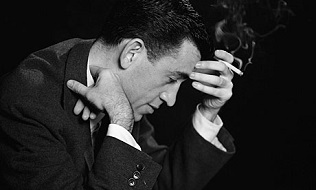
J.D. Salinger (1 januari 1919 – 27 januari 2010)
De Engelse romanschrijver en essayist Edward Morgan Forster werd geboren op 1 januari 1879 in Londen. Zie ook alle tags voor Edward Morgan Forster op dit blog.
Uit:A Passage to India
“Abandoning his bicycle, which fell before a servant could catch it, the young man sprang up on to the verandah. He was all animation. “Hamidullah, Hamidullah! am I late?” he cried.
“Do not apologize,” said his host. “You are always late.”
“Kindly answer my question. Am I late? Has Mahmoud Ali eaten all the food? If so I go elsewhere. Mr. Mahmoud Ali, how are you?”
“Thank you. Dr. Aziz, I am dying.”
“Dying before your dinner? Oh, poor Malimoud Ali!”
“Hamidullah here is actually dead. He passed away just as you rode up on your bike.”
“Yes, that is so,” said the other. “Imagine us both as addressing you from another and a
happier world.”
“Does there happen to be such a thing as a hookah in that happier world of yours?”
“Aziz, don’t chatter. We are having a very sad talk.”
The hookah had been packed too tight, as was usual in his friend’s house, and bubbled sulkily. He coaxed it. Yielding at last, the tobacco jetted up into his lungs and nostrils, driving out the smoke of burning cow dung that had filled them as he rode through the bazaar. It was delicious. He lay in a trance, sensuous but healthy, through which the talk of the two others did not seem particularly sad—they were discussing as to whether or no it is possible to be friends with an Englishman. Mahmoud Ali argued that it was not, Hamidullah disagreed, but with so many reservations that there was no friction between them. Delicious indeed to lie on the broad verandah with the moon rising in front and the servants preparing dinner behind, and no trouble happening.”
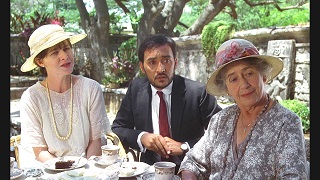
Edward Morgan Forster (1 januari 1879 – 7 juni 1970)>
Scene uit de film van David Lean uit 1984 met Judy Davis, Victor Banerjee and Peggy Ashcroft
De Amerikaanse schrijver Douglas Kennedy werd geboren op 1 januari 1955 in New York. Zie ook alle tags voor Douglas Kennedy op dit blog.
Uit: Leaving the World
“On the night of my thirteenth birthday, I made an announcement.
“I am never getting married and I am never having children.”
I can remember exactly the time and the place where this proclamation was delivered. It was around six p.m. in a restaurant on West 63rd Street and Broadway. The day in question was January 1, 1987, and I blurted out this statement shortly after my parents had started fighting with each other. Fueled by alcohol and an impressive array of deeply held resentments, it was a dispute that ended with my mother shouting out loud that my dad was a shit and storming off in tears to what she always called “the little girls’ room.” Though the other patrons in the restaurant gawked at this loud scene of marital discontent, their fight came as no great shock to me. My parents were always fighting—and they had this habit of really combusting at those junctures in the calendar (Christmas, Thanksgiving, the anniversary of their only child’s arrival in the world) when family values allegedly ruled supreme and we were supposed to feel “all warm and cuddly” toward each other.
But my parents never did warm and cuddly. They needed shared belligerence the way a certain kind of drunk needs his daily eye-opening shot of whiskey. Without it they felt destabilized, isolated, even a little lost. Once they started baiting and taunting each other, they were in a place they called home. Unhappiness isn’t simply a state of mind; it is also a habit . . . and one that my parents could never shake.
But I digress. New Year’s Day, 1987. We’d driven in from our home in Old Greenwich, Connecticut, for my birthday. We’d gone to see the New York City Ballet perform the famous Balanchine production of The Nutcracker. After the matinee we adjourned to a restaurant called O’Neals’, opposite Lincoln Center. My dad had ordered a vodka martini, then downed a second, then raised his hand for a third.”
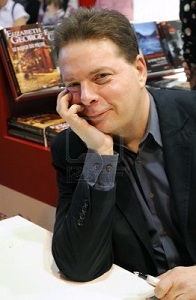
Douglas Kennedy (New York, 1 januari 1955)
De Nederlandse schrijfster Rascha Peper (pseudoniemvan van Jenneke Strijland) werd geboren op 1 januari 1949 in Driebergen. Zie ook alle tags voor Rascha Peper op dit blog.
Uit: Handel in veren
“De vochtigheid vond Henk Bronkhorst erger dan de hitte. Niet alleen tikten aan alle kanten druppels van de bomen en klimplanten en moest je na iedere stap je schoenen uit het soppende slik trekken, maar de van zweet en water doordrenkte kleren en schoenen kreeg je ook niet meer droog. Er stond geen zuchtje wind en nergens was open gebied.
Na anderhalf uur stijgen door rottende en schimmelende vegetatie bracht de Ambonese bediende van de zendeling bij wie ze overnacht hadden – een lenige jongen in lendendoek die speciaal voor het ‘even meelopen’ een paar tot op de draad versleten hoge soldatenschoenen had aangetrokken – hen bij een pasanggrahan, waar hun gids vlakbij zou wonen. In de hut, onder het breed afhangende dak van palmbladeren, waren Papoea-vrouwen in de weer rond een houtvuur, waarvan de rook uit een gat in het dak opsteeg. De Ambonees riep iets naar hen, waarop twee jonge vrouwen verlegen lachend aan de rand van de hoge plankenvloer kwamen staan, terwijl een tiental kinderen tussen de palen onder de vloer opdook en de vreemdelingen binnen een mum van tijd omringde.
Ze namen uitvoerig alle begroetingsrituelen in acht. Voor zulke gelegenheden
had Bronkhorsts jonge collega Rijk zijn broekzak vol karamels, die hij meteen begon uit te delen. Deze kinderen hadden echter nog zelden of nooit blanken gezien en wisten niet wat snoepjes waren; ze pakten ze wel aan, maar stonden ze onwennig rond te draaien, alsof de knisperende pakketjes in hun hand plotseling zouden kunnen wegvliegen als kevers.”
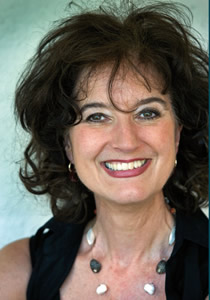
Rascha Peper (Driebergen, 1 januari 1949)
De Duitse schrijver en filosoof Rüdiger Safranski werd geboren op 1 januari 1945 in Rottweil. Zie ook alle tags voor Rüdiger Safranski op dit blog.
Uit: Goethe – Kunstwerk des Lebens
„Goethe ist ein Ereignis in der Geschichte des deutschen Geistes – Nietzsche meinte, ein folgenloses. Doch Goethe war nicht folgenlos. Zwar hat die deutsche Geschichte seinetwegen keinen günstigeren Verlauf genommen, aber in anderer Hinsicht ist er überaus folgenreich, und zwar als Beispiel für ein gelungenes Leben, das geistigen Reichtum, schöpferische Kraft und Lebensklugheit in sich vereint. Ein spannungsreiches Leben, dem einiges in die Wiege gelegt war, das aber auch um sich kämpfen mußte, bedroht von inneren und äußeren Gefahren und Anfechtungen. Was immer wieder fasziniert, ist die individuelle Gestalt dieses Lebens. Das ist keine Selbstverständlichkeit.
Heute sind die Zeiten nicht günstig für die Entstehung von Individualität. Die Vernetzung aller mit allen ist die große Stunde des Konformismus. Goethe war mit dem gesellschaftlichen und kulturellen Leben seiner Zeit aufs innigste verbunden, aber er verstand es, ein Einzelner zu bleiben. Er machte es sich zum Grundsatz, nur so viel Welt in sich aufzunehmen, wie er auch verarbeiten konnte. Worauf er nicht irgendwie produktiv antworten konnte, das ging ihn nichts an, mit anderen Worten: Er konnte auch wunderbar ignorieren. Selbstverständlich mußte auch er an vielem Anteil nehmen, das er sich lieber erspart hätte.“

Rüdiger Safranski (Rottweil, 1 januari 1945)
Zie voor nog meer schrijvers van de 1e januari ook mijn vorige blog van vandaag.
